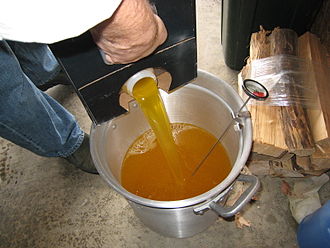Peanut oil
Peanut Oil[edit]

Peanut oil, also known as groundnut oil, is a type of vegetable oil derived from peanuts (Arachis hypogaea). It is commonly used in cooking, especially for frying, due to its mild flavor and high smoke point.
Composition[edit]
Peanut oil is composed primarily of monounsaturated and polyunsaturated fats, with a smaller proportion of saturated fat. The main fatty acids in peanut oil include:
These fatty acids contribute to the oil's stability and health benefits.
Production[edit]
Peanut oil is produced by pressing the peanut kernels to extract the oil. The process can be done using either cold pressing or more industrialized methods involving heat and chemical solvents. Cold-pressed peanut oil retains more of the natural flavors and nutrients.
Uses[edit]
Culinary[edit]
Peanut oil is widely used in Asian cuisine, particularly in Chinese, Indian, and Southeast Asian cuisine. It is favored for its high smoke point, which makes it ideal for deep frying and stir frying.
Industrial[edit]
Beyond culinary uses, peanut oil is also used in the production of biodiesel and as a lubricant in machinery.
Health Benefits[edit]
Peanut oil is considered heart-healthy due to its high content of monounsaturated fats, which can help reduce cholesterol levels and lower the risk of heart disease. It also contains vitamin E, an antioxidant that helps protect cells from damage.
Allergies[edit]
While refined peanut oil is generally considered safe for individuals with peanut allergies, unrefined or cold-pressed peanut oil may contain peanut proteins that can trigger allergic reactions. It is important for individuals with peanut allergies to consult with a healthcare provider before consuming peanut oil.
Related Pages[edit]
Ad. Transform your life with W8MD's Budget GLP-1 injections from $75


W8MD offers a medical weight loss program to lose weight in Philadelphia. Our physician-supervised medical weight loss provides:
- Weight loss injections in NYC (generic and brand names):
- Zepbound / Mounjaro, Wegovy / Ozempic, Saxenda
- Most insurances accepted or discounted self-pay rates. We will obtain insurance prior authorizations if needed.
- Generic GLP1 weight loss injections from $75 for the starting dose.
- Also offer prescription weight loss medications including Phentermine, Qsymia, Diethylpropion, Contrave etc.
NYC weight loss doctor appointmentsNYC weight loss doctor appointments
Start your NYC weight loss journey today at our NYC medical weight loss and Philadelphia medical weight loss clinics.
- Call 718-946-5500 to lose weight in NYC or for medical weight loss in Philadelphia 215-676-2334.
- Tags:NYC medical weight loss, Philadelphia lose weight Zepbound NYC, Budget GLP1 weight loss injections, Wegovy Philadelphia, Wegovy NYC, Philadelphia medical weight loss, Brookly weight loss and Wegovy NYC
|
WikiMD's Wellness Encyclopedia |
| Let Food Be Thy Medicine Medicine Thy Food - Hippocrates |
Medical Disclaimer: WikiMD is not a substitute for professional medical advice. The information on WikiMD is provided as an information resource only, may be incorrect, outdated or misleading, and is not to be used or relied on for any diagnostic or treatment purposes. Please consult your health care provider before making any healthcare decisions or for guidance about a specific medical condition. WikiMD expressly disclaims responsibility, and shall have no liability, for any damages, loss, injury, or liability whatsoever suffered as a result of your reliance on the information contained in this site. By visiting this site you agree to the foregoing terms and conditions, which may from time to time be changed or supplemented by WikiMD. If you do not agree to the foregoing terms and conditions, you should not enter or use this site. See full disclaimer.
Credits:Most images are courtesy of Wikimedia commons, and templates, categories Wikipedia, licensed under CC BY SA or similar.
Translate this page: - East Asian
中文,
日本,
한국어,
South Asian
हिन्दी,
தமிழ்,
తెలుగు,
Urdu,
ಕನ್ನಡ,
Southeast Asian
Indonesian,
Vietnamese,
Thai,
မြန်မာဘာသာ,
বাংলা
European
español,
Deutsch,
français,
Greek,
português do Brasil,
polski,
română,
русский,
Nederlands,
norsk,
svenska,
suomi,
Italian
Middle Eastern & African
عربى,
Turkish,
Persian,
Hebrew,
Afrikaans,
isiZulu,
Kiswahili,
Other
Bulgarian,
Hungarian,
Czech,
Swedish,
മലയാളം,
मराठी,
ਪੰਜਾਬੀ,
ગુજરાતી,
Portuguese,
Ukrainian